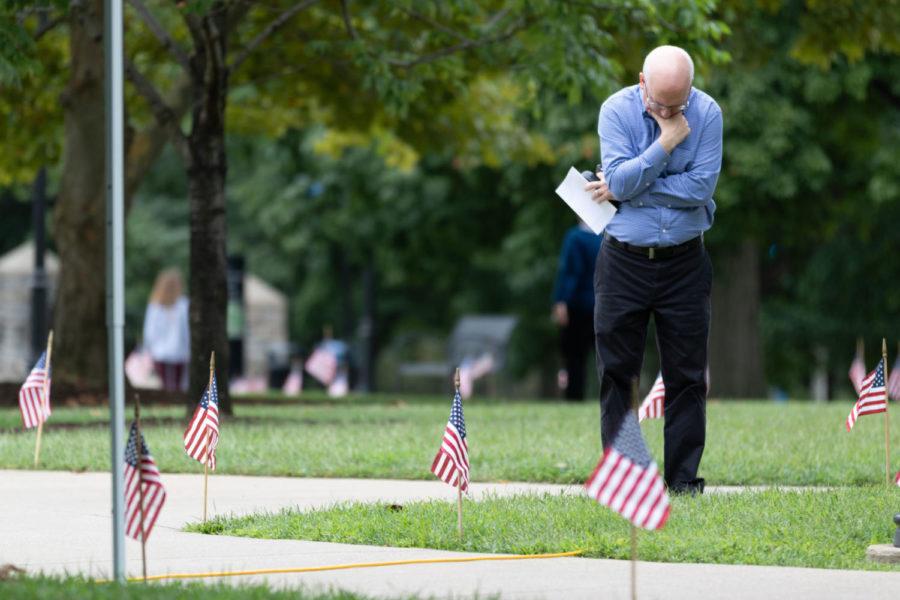How the memory of the 9/11 tragedy lives on
A man remembers the fallen victims of 9/11. UK Army and Air Force ROTC placed nearly 3,000 flags this morning in front of the administration building and had speakers read out the names of fallen victims of the terrorism attacks of September 11th, 2001 on Tuesday, September 11, 2018 in Lexington, Kentucky. Photo by Michael Clubb | Staff
September 9, 2021
It is the 20-year anniversary of the 9/11 tragedy.
For many Americans, this means the 20-year anniversary of losing a loved one. Some grieve despite not having lost anyone, due to the strife that this day caused.
The immediate repercussions of 9/11 — the 2,996 lives lost during the actual falling of the twin towers — is only a fraction of the damage done by the event itself and our nation’s reaction to this event.
The Patriot Act, the TSA and the glorification of 9/11 through films are a few indignations caused by the attacks. Unfortunately, there are other repercussions that have only added to the pain and suffering.
The alarming increase in Islamophobia-related hate crimes
Data collected by the FBI found that in 2000, there were 28 hate crimes against Muslims. In the previous years, this number wavered slightly, but it never surpassed 35 per year starting in 1996.
In 2001, there were 481 hate crimes against Muslims. These numbers have since dropped, but have never returned to what they were before 9/11.
The purveyors of these crimes must think that these hate crimes have possibly been to prevent terrorism, in some strange form of vigilante justice. The generalization of Muslims has only led to more terrorism and mass death.
This sharp increase is due to the deadly generalization of Muslim people as terrorists or inherently violent people. While this is obviously not true, the nationalism some Americans hold fuels the hatred toward people that have nothing to do with acts of terrorism or religious extremism.
Unfortunately, mosques are a huge target for this racist sentiment. According to the American Civil Liberties Union, there have been 11 or more anti-mosque attacks since 2005 in Florida, Washington, Texas, California and Virginia. Forty-four states have had at least one, and there are even more outside of the U.S.
The longest war in American history
The U.S. government quickly responded to the terrorist attacks on 9/11 when former President George W. Bush signed a congressional resolution on Sept. 18, 2001, authorizing the use of force in Afghanistan against the parties responsible for the attacks.
The war and occupation did not stop in Afghanistan. Bush and his administration claimed there were weapons of mass destruction in Iraq and sent troops there to find them in 2002. U.S. troops, having never found any weapons of mass destruction, finally left Iraq from this mission in 2011, though they returned to help the Iraqi government combat the Islamic State group.
Although Osama bin Laden, the architect of the 9/11 attacks, was found and killed in 2011, the war was far from over.
The reason given for the occupation of Afghanistan is counterterrorism. This evolved into a war against the Taliban to resist their growing power in the Middle East.
It wasn’t until Aug. 31, 2021, that the final U.S. troops departed from Afghanistan. After all this time, the Taliban still claimed this land as their own as soon as the U.S. evacuated.
The war, not including the massive airlift by Biden to evacuate American soldiers and citizens, has cost $2.3 trillion in borrowed money and 47,245 Afghan civilian lives lost, according to the Associated Press.
Though we should never forget the tragedy of 9/11 and all that’s come since, there have been no significant foreign attacks since. Our nation is more than able to conduct counterterrorism on our own soil.
“In the councils of government, we must guard against the acquisition of unwarranted influence, whether sought or unsought, by the military-industrial complex. The potential for the disastrous rise of misplaced power exists, and will persist,” said former President Dwight Eisenhower about the military industrial complex.
Occupation of the Middle East and the strengthening of the military industrial complex have only allowed our government to ignore dire circumstances here at home. Institutionalized racism, prison reform, healthcare and extreme poverty are just some of the neglected issues.
There is so much work to be done here at home.

































































































































































Phillip Michaels • Sep 2, 2022 at 5:43 am
Unlike much of the coverage on 9/11, this article is a short but clear-eyed review of the consequences of that event. However difficult it may be to believe, our part in the tragedy is even worse than outlined here. The attacks in New York were an inside job as demonstrated by the characteristics of the collapses of the World Trade Center buildings that could only have been achieved by controlled demolition. Three asymmetrically-damaged buildings can’t naturally collapse symmetrically in near freefall.